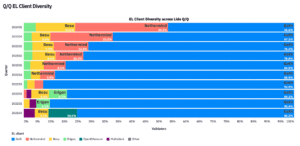Liquid staking leader Lido has substantially improved its execution client diversity.
Go Ethereum (Geth), the most popular execution client, has seen its usage among validators run by Lido node operators decrease to 46.6% at the end of Q1 2024 from 67.1% in the previous quarter, according to a report published by Lido on Wednesday.
Lido’s usage of Geth has decreased each quarter since Q3 of 2022 when nearly 93% of all validators run by Lido node operators were using Geth, which posed risks to the security of Ethereum itself, especially if a bug were to be found in the supermajority client.

Ethereum clients are software programs that individuals can download to participate in running the Ethereum network. Each validator usually operates two clients simultaneously to handle various aspects of Ethereum: one for the consensus side and another for the execution layer.
Lido’s node operators had wanted to improve their execution client diversity, because having a “supermajority client” like Geth where the majority of validators are running the same software client can lead to negative outcomes for stakers, such as loss of staked ETH, and even for Ethereum, such as a chain split, which could have brought lasting reputational damage to the second-largest blockchain network.
In Jan. 2024, two minority Ethereum execution clients, Besu and Nethermind, suffered bugs. While both were resolved and had minimal impact, the incidents had sparked concerns of the hypothetical possibility of a similar bug impacting Geth, which could have caused an outage for Ethereum insofar as validators wouldn’t be able to produce blocks since the majority of them used Geth.
Lido’s decreased usage of Geth is “significant because it shows both that alternative clients have finally matured enough where many participants in the network are comfortable running non-Geth clients at a very high rate,” wrote Kasper Rasmussen, Lido marketing lead, to Unchained in a Telegram message.
Alternative execution clients to Geth—Besu and Nethermind—have both seen their adoption grow since last quarter. Over a third of validators run by Lido node operators use Nethermind as their execution client, an increase from 23.2% in Q4 2023, while Besu’s share has more than doubled from 6.9% last quarter to 14.6% in Q1 of 2024.
With the same goal of reducing existential risks to Ethereum, in Feb. 2024, Coinbase began implementing a plan to diversify its Ethereum staking architecture by rolling out support for two execution clients, Nethermind and Erigon, in addition to Geth.
“It’s important not only for the resilience of the network that the ‘multi-client’ approach is playing out in practice but also emblematic of the efficacy of Ethereum’s soft-governance approach via consensus and transparency,” Rasmussen said. “From a Lido protocol perspective, it’s important that the node operators of the largest staking protocol and the DAO are aligned in the values of decentralization and creating robust validator sets.”
Lido, which pioneered liquid staking, is the largest decentralized finance protocol with a total locked value of nearly $34.89 billion at the time of writing, data from DeFiLlama shows. Of the over 32.5 million ETH staked, Lido is responsible for almost 9.28 million or about 28.54% of total ETH staked, per a Dune dashboard created by Hildobby.



